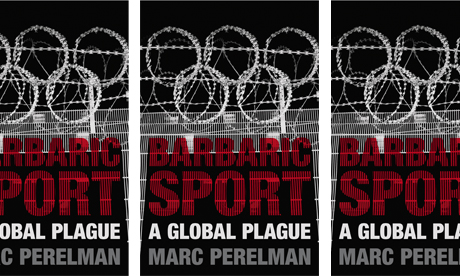Barbaric Sport: A Global Plague – review

Barbaric Sport: A Global Plague
With London 2012 nearly upon us, many will have indulged in a wee moan about the Olympics – their commercialisation, their cost, and the disruption they will cause being favourite themes. An enterprising few have gone further and put down their thoughts on the damage wrought by the Games. We have seen Ian Sinclair’s Ghostmilk, Hilary Powell and Isaac Marrero-Guillamón’s Art of Dissent, and the introductory chapter of Anna Minton’s Ground Control (2012 edition) – all trenchant critiques of the Olympic industry and its impact on East London.
To mark this summer’s occasion and add to the mounting disquiet, Verso has issued a translation of Marc Perelman’s Barbaric Sport: A Global Plague (originally published last year). The title does rather give the plot away, but if you go in for eloquent rants, this book could quite possibly help you wile away the hours when stuck on the Tube this summer.
Those looking for direct commentary on the 2012 Games should go elsewhere, as this book contains only one brief mention in passing of this summer’s events. What this slim tome does offer is a critical theory account – in the style of Adorno or Horkheimer laced with Baudrillard – of international sport as a social phenomenon.
Not so much an economic as a cultural analysis in 19 short essays, Barbaric Sport traces the authoritarian uses to which sport had been put, the architectural ravages it has wreaked in places such as Beijing (the author is himself an architect by training), and the links between sport and violence.
Sport, Perelman informs us, was born in England. He goes on to explain how “originally a class practice, sport developed during the nineteenth century in tandem with the consolidation of imperialism”.
Not afraid of hyperbole, he is perfectly comfortable maintaining that sport is now “largely responsible for the barbaric society to which we are subjected, unable as we are to devise any real form of resistance to its violence”, or that “the steamroller of decadent modernity, sport flattens everything as it passes and becomes the sole project of a society without project. […] As a world power, sport is not only a solitary, uniting, unifying force but the very mode and the model of the current globalization”.
Writing on the Olympics, Perelman mounts a tentative Marxist critique – “the modern Games are based on an appropriation and dominion of the body as a source of labour power and output” – but fails to develop seriously what might have been an interesting materialist analysis of the 21st century Games.
Overall, the text is somewhat disjointed and intellectually flabby, with passages verging on the meaningless such as: “the spectacle of sport is totalitarian in the sense that is achieves the difficult task of uniting time, space and action with a superior unity between a time, a space and an action mediated by sport”.
At the same time, the volume does contain some interesting ideas, such as the notion that sport is the contemporary opiate of the people, “more alienating than religion because it suggests the scintillating dream of a promotion for the individual, holds out the prospect of a parallel hierarchy”, or the parallel between sport and pornography, which fuse in the cultural expression Perelman dubs ‘sporn’.
The political message of this book is a depressing one – we are all caught up in the ‘homogenising’ force of contemporary international sport, which has undermined the ability of previously-radical youth to protest and sublimated our oppositional potential.
So what is the answer? The book’s concluding sentence pulls no punches: “there should be no sport”.
Marc Perelman
Barbaric Sport: A Global Plague
Translated from French by John Howe
Verso, 134 pp
RRP £8.99
ISBN: 978 1 84467 859 4.
